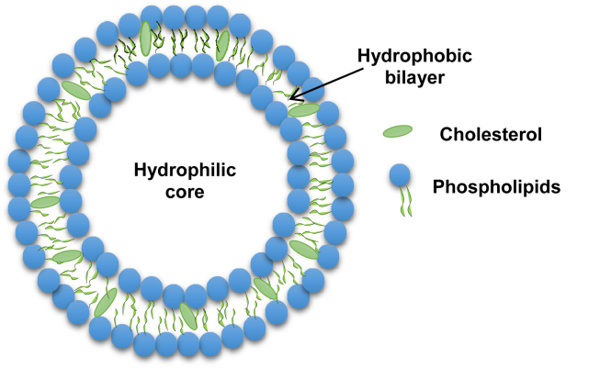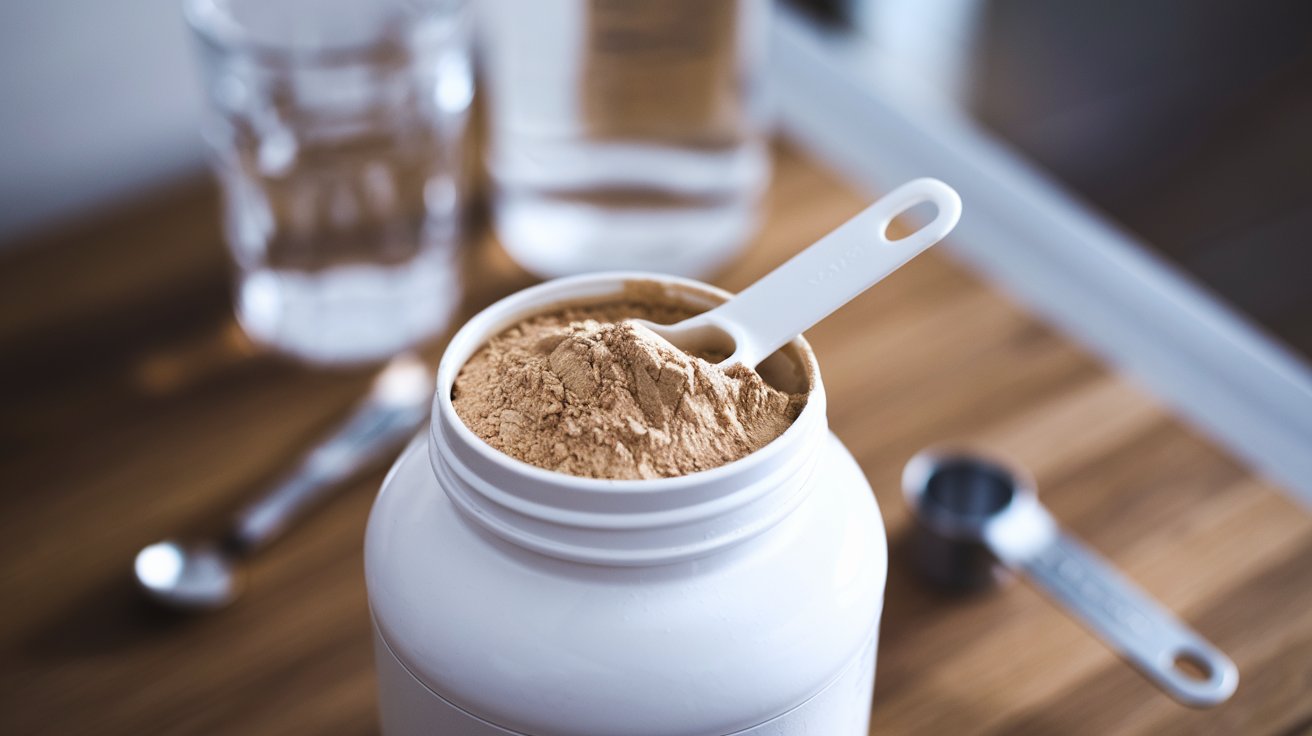Liposomal technology in supplements - what do you need to know about it?

Even the most interesting supplement in theory is worthless if we can't get it into the right tissues. And in this aspect, some substances are particularly grubby. Are you familiar with curcumin and coenzyme Q10? These are examples of supplements that, without using any tricks, will assimilate only symbolically. They may then perform poorly. In such cases, one of the best possible ways to benefit from the substance's effects is to package it in liposomes. Liposomal dietary supplements are substances that have gained an extra, protective coating that allows them to effectively sneak through any difficulties in the stomach and intestines.
From this article you will learn more about liposomes and liposomal dietary supplements - how they work, what they are made of and what benefits they will give you. Be sure to read to the end!
- Liposomes are a way to efficiently transport active substances
- Advantages and disadvantages of liposomal technology
- Liposomal supplements on offer at MZ-Store
- Is it worth choosing liposomal supplements?
- Let's look to the future - can liposomes be even better?
Liposomes are a way to efficiently transport active substances
Liposomes are sphere-shaped vesicles consisting of one or more phospholipid bilayers[1]. In the center of the liposome is an aqueous core, in which the molecules of the actual active substance are enclosed. Liposomes were first described in the literature as early as the mid-1960s. Today, liposomes are used for both dietary supplements and drugs.
In practice, liposomes are such "protective coats" that surround the actual substances. In the case of dietary supplements, liposomes are supposed to protect the active substances from any problems they might encounter in the digestive system, such as unfavorable pH values, contact with digestive juices, intestinal bacteria or enzymes that might break them down, etc. On the other hand, liposomes also protect the digestive system from the active ingredient, which in some cases can be, for example, an irritant to the mucosa.
Liposomes are currently considered the most widely used nanocarriers for various potentially active hydrophobic and hydrophilic molecules due to their high biocompatibility, biodegradability and low immunogenicity[3]. Liposomes have also been proven to increase the solubility of substances and enable controlled distribution. In addition, they have been shown to have the ability to modify surfaces for targeted, prolonged and extended release. All this makes liposomes a very attractive technology that opens many new doors in supplementation and treatment.
 Image Source - PMID: 35600452
Image Source - PMID: 35600452
Liposomes are mainly formed from phospholipids, such as soybean or sunflowerphosphatidylcholine. The incorporation of cholesterol into liposomes is essential because cholesterol modulates membrane permeability, alters fluidity and improves the stability of bilayer membranes in the presence of biological fluids such as blood and plasma. Cholesterol was not present in first-generation liposomes, but at some stage it began to be used to improve product properties.
Liposomal technology is also used in drugac
In the US and the EU, at least 14 drugs have been approved for use in liposomal form, not including generics and those approved at the level of a single European country. Examples[2]:
- doxorubicin (Caelyx/Doxil) - a drug used for ovarian cancer, Kaposi's sarcoma, myeloid melanoma; approved in the US as early as 1995 and e EU in 1996;
- amphotericin B (AmBisome) - drug for systemic fungal infections;
- morphine (DepoDur) - a drug for postoperative pain;
- bupivacaine (Exparel) - a drug for postoperative anesthesia.
In medicine, the use of liposomes is mainly focused on cancer therapy, but also includes other areas such as infections, anesthesia, vaccines, lung diseases and photodynamic therapy. They are mainly in powder form or in suspensions. Routes of administration include intravenous infusion, intramuscular and intrathecal injection, epidural anesthesia, topical infiltration and oral inhalation.
However, there are some differences in the technology for creating liposomes, depending on whether they are to be used as injectable drugs or as oral supplements. For injectable drugs, the particles must be tiny so as not to "clog" blood vessels. Substances administered orally, on the other hand, do not pose such a risk and should have larger particles with more layers of phospholipids (like a bulb) to give the substance better protection in the gastrointestinal tract.
Advantages and disadvantages of liposomal technology
Key advantages of liposomes:
- protect transported substances from premature breakdown in the gastrointestinal tract;
- significantly increase the absorption of active substances;
- can transport both water-soluble and fat-soluble substances at the same time;
- are made of phospholipids that are friendly to human health and biocompatible;
- there is no need for other assimilability-enhancing excipients;
- they protect the gastrointestinal tract from the irritating effects of certain substances.
Disadvantages of liposomes:
- the biggest disadvantage is the price, due to the expensive technological process;
- sometimes phospholipids undergo oxidation and hydrolysis reactions.
Liposomal supplements on offer at MZ-Store
We have many customers who insist on quality without compromise. That's why you'll find much more than just basic liposomal vitamin C in our offer. For years, MZ-Store has been providing its customers with liposomal glutathione, curcumin and other substances that have very low bioavailability without assimilative technologies.
Unique liposomal technology from DWATRO Laboratories
We have a special trust in the brand DWATRO Laboratories, whose main business is precisely the work on liposomal technology. It is a Polish brand under the leadership of Ms. Dorota Wątróbska-Swietlikowska.
DWATRO Laboratories supplements stand out on several levels. First and foremost, the technological background of this company is very advanced. The method of creating liposomes is extremely refined and protected by a patent under the name DWATRO®LIP. When you choose DWATRO supplements, you are assured that their contents are actually liposomal substances of the highest quality, without the compromises found on the market.
Further advantages are the absence of unnecessary additives and fillers. This was achieved, among other things, by putting the portions of the supplements in sachets, which is another advantage. Accurately measured portions and easy-to-open sachets are a very convenient solution.
In our offer you will find DWATRO liposomal supplements, which contain ingredients such as:
- fish collagen,
- curcumin,
- sea buckthorn oil,
- DHA acid from algae,
- iron,
- and many others.
Is it worth choosing liposomal supplements?
I'm sure many of you are asking yourselves this question, because liposomal supplements are simply more expensive than their classic counterparts. Nevertheless, the benefits of better absorption can more than compensate for all the zlotys spent.
Liposomal supplements are worth choosing because:
- they provide greater certainty of delivering the active substance to the right place in the body,
- are better tolerated by the digestive system than traditional forms,
- they increase the effectiveness of supplementation.
Let's look to the future - can liposomes be even better?
Many promising technologies are still in development, but in the near future some of them may move to the stage of commercialization. One of the most interesting properties possible with liposomes is the precise delivery of substances where they are needed. We are talking, among other things, about actively targeting immunoliposomes, or stimulus-sensitive liposomes[2][3]. Using various stimuli such as temperature, pH, light, electromagnetic fields, enzymes and hypoxia, it will be possible to send "on-off" signals to liposomes, which could greatly enrich therapeutic possibilities.
There are already a handful of benefits that liposomal technology offers us, but not all the cards have been revealed. We are left to watch with hope the further progress of scientists' work on liposomes to benefit from even better properties of drugs and dietary supplements in the future.
Sources:
 ⮜ Previous article
⮜ Previous article
How to use protein supplements?
 Next article ⮞
Next article ⮞